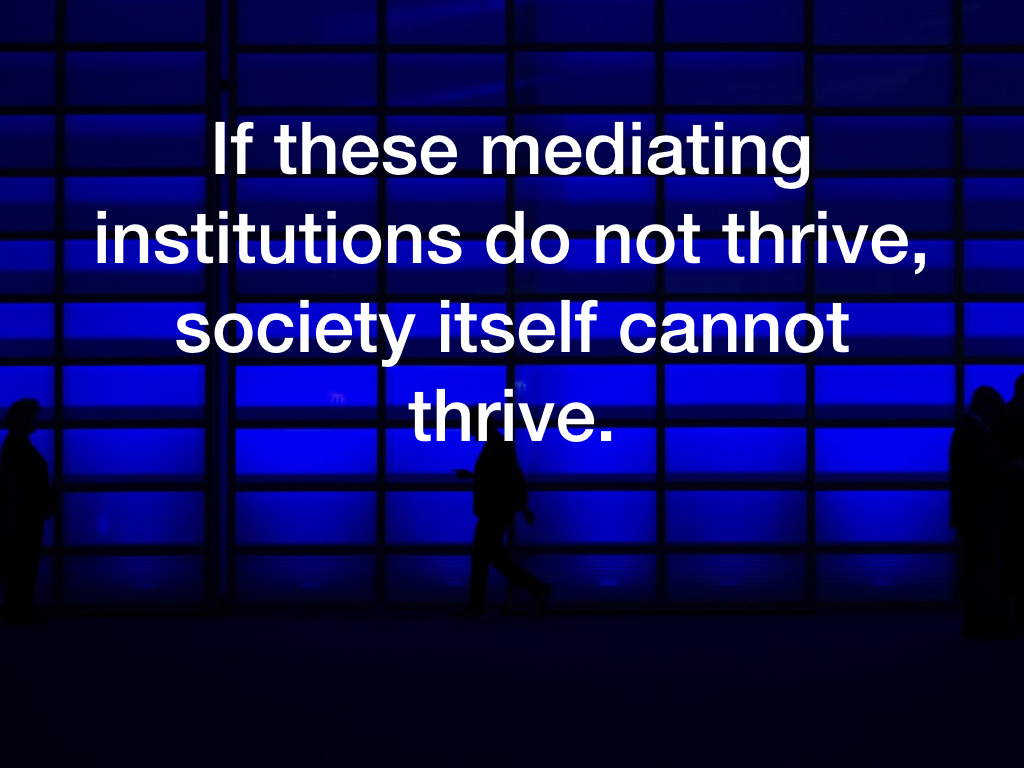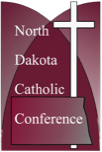
Mediating Institutions
by Christopher Dodson
Executive Director
North Dakota Catholic Conference
October 2019
A recent hearing held by the interim Judiciary Committee gave me an opportunity to talk about the importance of voluntary organizations in society.
The committee is studying the implementation of the new ethics provision of the state constitution and related laws. The committee chairman invited me to give a perspective on how the new laws might impact the ability of religious and charitable organizations ability to lobby. Although I shared a few thoughts on the new law and lobbying itself, I devoted most of my testimony to the importance of voluntary organizations in a democracy and why any laws affecting lobbying should not diminish their ability to participate in the political process.
The Catholic Church calls these associations “mediating institutions” because they protect the individual from the power of the state and they provide a means for the individual to interact with the state and with each other. These mediating institutions, whether they are economic, social, cultural, sports-oriented, recreational, professional, or political are essential to a civil society because they respect the dignity of the human person. In turn, a good government does not suppress mediating institutions, but supports them in their efforts.
If these mediating institutions do not thrive, society itself cannot thrive. This is especially true if the family, which is the primary institution of society, is replaced by an all-powerful government or philosophy of individual autonomy. An example of the former is Soviet Russia and other collectivist governments. An example of the latter are ideologies like libertarianism that refuse to see covenantal connections between persons.
Mediating institutions, therefore, flow from recognizing the principle of subsidiarity. Subsidiarity is the principle that "a community of a higher order should not interfere in the internal life of a community of a lower order, depriving the latter of its functions, but rather should support it in case of need and help to coordinate its activity with the activities of the rest of society, always with a view to the common good.” (CCC 1883)
As I wrote in a previous column: “All of the church’s social doctrine flows from the recognition that every human person has a life and dignity that society must respect, protect, and foster. Being social creatures, that is done through community, starting with the family. From the family outward we develop groups, associations, relationships, and institutions that make it possible achieve social growth and to function as a civil society.”
Pope Pius XI formulated the Church’s teaching on subsidiarity and mediating institutions in 1931, but exactly one hundred years before that a French aristocrat observed something similar in the newly formed United States.
Alexis de Tocqueville was a diplomat and political philosopher who toured the United States in 1931. His observations, published as Democracy in America, remains to this day an important in understanding American history and democratic ideas.
Tocqueville noted the propensity of Americans to form associations for both political and social purposes. He wrote:
Americans of all ages, all conditions, all minds constantly unite. Not only do they have commercial and industrial associations in which all take part, but they also have a thousand other kinds: religious, moral, grave, futile, very general and very particular, immense and very small; Americans use associations to give fêtes, to found seminaries, to build inns, to raise churches, to distribute books, to send missionaries to the antipodes; in this manner they create hospitals, prisons, schools. Finally, if it is a question of bringing to light a truth or developing a sentiment with the support of a great example, they associate.
He noted that the creation of associations or groups was not just an inherent part of a democratic society, but that they were also essential to preserving a democratic system of government. Without them, he contended, the democratic experiment would fail. In a society dedicated to the principle that all persons are independent and equal and, therefore, do not possess the power to command others as in an aristocracy or dictatorship, society could not function without the ability of citizens to voluntarily form associations to aid each other.
What Tocqueville saw in 1831 as essential to democracy, the Catholic Church saw in 1931 as essential to society and human dignity. Social scientists have observed decreased participation in voluntary organizations over the last fifty years. At the same time, the ability of mediating institutions continues to be threatened by government overreach, extreme individualism, and the breakdown of social bonds. What will be the state of mediating institutions in 2031?
What We Do
The North Dakota Catholic Conference acts on behalf of the Roman Catholic bishops of North Dakota to respond to public policy issues of concern to the Catholic Church and to educate Catholics and the general public about Catholic social doctrine.

Contact Us
North Dakota Catholic Conference
103 South Third Street, Suite 10
Bismarck, North Dakota
58501
1-888-419-1237
701-223-2519
Contact Us

